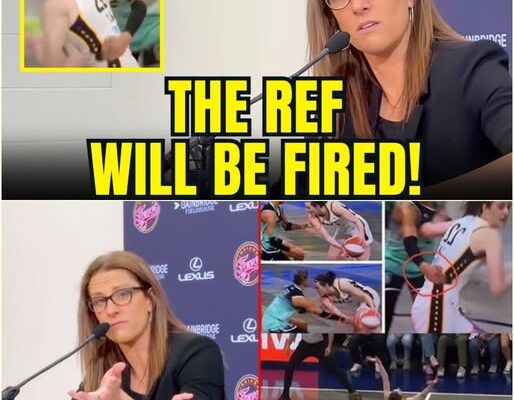The WNBA found itself at the center of a firestorm this week after Stephanie White, a respected coach and former player, took the extraordinary step of publicly exposing what she described as blatant game-rigging during a recent high-stakes matchup. The incident has not only cast a shadow over the league’s integrity but has also left one referee facing instant regret and an avalanche of criticism from fans, players, and analysts alike. The fallout from these explosive allegations is reverberating across the basketball world, raising serious questions about the fairness and transparency of WNBA officiating.
The controversy began during a tightly contested game that saw White’s team, in a crucial playoff push, suffer a series of questionable calls. Throughout the match, fans and commentators noted a string of decisions that seemed to disproportionately favor the opposition. Tensions mounted as pivotal moments—missed fouls, dubious technicals, and unexplainable turnovers—shifted momentum away from White’s squad. Social media erupted with real-time reactions, with hashtags like #RiggedGame and #WNBAJustice trending as the game unfolded.
In the postgame press conference, Stephanie White didn’t hold back. With a calm yet firm demeanor, she detailed the sequence of events she believed demonstrated a clear bias from the officiating crew. “We play this game with heart and integrity,” White stated. “But tonight, what happened on that court was not basketball. It was manipulated, and everyone saw it.” Her words sent shockwaves through the league, as few coaches have ever so directly accused referees of game-fixing in such a public forum.
Within hours, video clips of the most controversial calls circulated widely online. Fans dissected every frame, highlighting moments where the officiating appeared egregiously one-sided. Basketball analysts on major sports networks replayed the footage, with many agreeing that the sequence of calls was, at best, highly suspect. Calls for accountability grew louder, with demands for both the WNBA and the officiating body to investigate the matter thoroughly.
The referee at the center of the storm, whose identity quickly became public knowledge, reportedly experienced “instant regret” as the magnitude of the situation became clear. Sources close to the league revealed that the official, who had previously enjoyed a reputation for fairness, was visibly shaken after the game. The backlash was swift and unforgiving, with fans flooding social media with criticism and even some players voicing their dismay at the officiating standards.
For the WNBA, the timing couldn’t be worse. The league has been enjoying a surge in popularity, with record-breaking attendance and viewership driven by star players and a new generation of fans. However, the specter of a rigged game threatens to undermine the credibility of the entire season. League executives were quick to issue a statement, promising a “full and transparent investigation” into the events of the game in question. “The integrity of our sport is paramount,” the statement read. “We take all allegations of misconduct seriously and will review the matter with the utmost diligence.”
Stephanie White’s decision to go public with her accusations has sparked a broader conversation about the state of officiating in women’s basketball. Coaches from across the league have expressed support for White, with several noting that inconsistent refereeing has been a persistent problem. “We owe it to our players and fans to ensure that every game is decided by skill and effort, not by questionable calls,” said one veteran coach. The incident has also reignited debates about the need for greater oversight, improved referee training, and perhaps even the introduction of expanded replay review to minimize human error.
Meanwhile, the accused referee faces an uncertain future. While the outcome of the league’s investigation remains pending, the damage to the official’s reputation may be lasting. In the world of professional sports, trust is everything—and once lost, it is difficult to regain. The referee’s “instant regret” is emblematic of the high stakes involved not only for individual officials but for the league as a whole.
Fans, for their part, have been vocal in demanding change. Online petitions calling for the suspension or removal of the referee have garnered thousands of signatures. Comment sections are filled with passionate arguments about the need for reform, with many pointing out that the WNBA, as a growing league, cannot afford even the perception of corruption or favoritism. “We love this league, but we need to believe that what we’re watching is real,” wrote one longtime fan on Twitter.
The players, too, have weighed in. Several athletes spoke anonymously to reporters, expressing frustration at what they perceive as a lack of accountability for referees. “We train our whole lives for these moments,” said one player. “To have a game taken out of our hands by bad calls—it’s heartbreaking.” Others have called for the formation of a players’ committee to work with the league on officiating standards and dispute resolution.
As the WNBA’s investigation gets underway, all eyes are on the league’s leadership to see how they will respond. The outcome of this case could set a precedent for how future allegations are handled and will likely influence the league’s reputation for years to come. Transparency, accountability, and a commitment to fair play are now more important than ever.
Stephanie White’s bold stand has already had a ripple effect. Her willingness to speak out has empowered others in the league to voice their concerns, creating momentum for change. Whether the league can seize this moment to restore trust and ensure that such incidents do not happen again remains to be seen.
In the end, the controversy serves as a stark reminder of what is at stake in professional sports. The passion of the fans, the dedication of the players, and the integrity of the game itself all depend on the belief that competition is fair and outcomes are earned. As the WNBA navigates this crisis, it must do so with transparency and resolve, knowing that the eyes of the sports world are watching.
The story of Stephanie White exposing a potentially rigged game, and the instant regret felt by the referee involved, is more than just a headline—it is a pivotal moment for the league. How the WNBA responds will determine not only the fate of those directly involved but also the future direction of women’s professional basketball. For now, fans, players, and coaches alike wait anxiously for answers, hoping that justice will prevail and that the spirit of the game will emerge stronger than ever.




